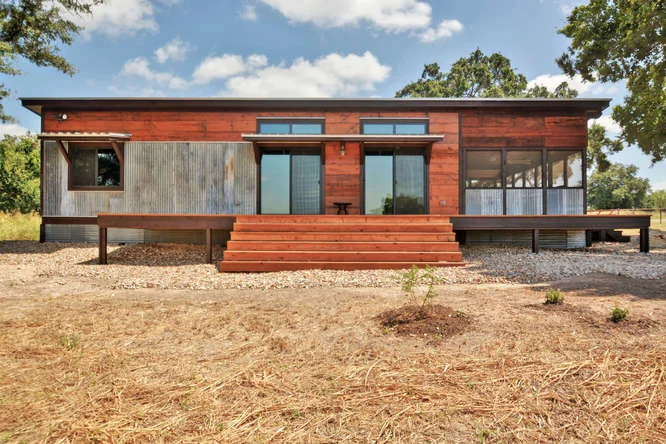I have noticed an increased social interest in Tiny Houses that made me think about some advantages and disadvantages of Tiny vs Small. My general assumption is that a Tiny House is @200sq.ft. or smaller, and probably on wheels. While a Small house is larger 200-1200sq ft. and sits on a foundation.
Tiny vs Small
Small Home by Reclaimed Space
The most obvious advantage to a tiny on wheels is the mobility they offer. Wheels under a house, how convenient if you plan to move it. I see stunning photos of tiny houses in the most beautiful settings but have yet to see one trucking down the road. I think most units find a good nest and stay put. So the mobility advantage could become a stability concern once your bird has landed in it's nest. Stabilizers, blocking, and wheel coverings are typically used to eliminate the "RV shake" and dress up your ride. I am always amazed by how many clever nooks and storage areas a person can create. Tinys tend to have lofts, which are cool but not always practical. Lofts make Tinys taller and less road-worthy. I am not a fan of the disproportionate heights some can grow. Seems to negate the advantages to being mobile, they struggle with crosswinds, height restrictions, and can have a general awkwardness of proportions that steal any hope of a true house-like appearance. No one wants to look like the Beverly Hillbillies rolling into town. Proportion and design is as important as functionality and cost savings.
Turn key or DIY?
Most people assume a tiny house is affordable, I always say, it is, if you DIY it. I have tried to price Tiny houses with the needed amenities and have always struggled to meet Tiny budgets. The amount of MEP (mechanical, electrical, plumbing) required is the same as a Small home. The only cost difference is the amount of building material they require. Trailers are not cheap and usually require modifications that can be costly. To achieve tiny budget costing, the fixture and finish budget is always sacrificed. This usually means RV quality fixtures not installed by a pro. Once you trim quality from the project your home is quickly susceptible to depreciation. How many used Tinys have sold for anywhere close to their construction cost? None that I know. One thing I really like about Tinys, is how many young people I see building their own. For first time home owners, building a tiny is a great solution to today's rising entry home cost. It also gives invaluable experience in understanding construction principals and even real estate development.
Advantages to going small
Some obvious advantages small homes have over Tinys. Permanent foundation, more space=more livable, transportable vs mobile, and they have a more traditional home appearance. Small homes tend to be finished with more stable foundations, set on piers or stem walls, some keep the skids and just block the corners (not preferred). They have a more "grounded" feel with less shake, and are less likely to be blown over in high winds. The larger footprint allows for more traditional uses of space, less lofts and more dedicated bedrooms. Small houses have larger more equipped kitchens than Tinys. If you want to have interior space to entertain, Smalls always win. They have more opportunity for access to outdoor space. Most Tinys have only one entrance, maybe because they are on a trailer. Trailers are limited by weight on the amount of deck space a trailer can move.
Transportable vs. mobile is an article by its self. A well built Small house can be moved many times, I shipped one from Austin to California, back to Austin, and then to a site overlooking the F-1 track. Another one was moved a total of 6 times in 2 years, both houses made it safely and had no structural or cosmetic issues or concerns.The cost to build a small is fractionally more than a tiny. Smalls do not require the purchase and modification of a trailer. This savings can be spent on foundation blocking, an eventual move or the needed move from the building location. My experience has shown me, that often times, Smalls are built better than Tinys. I find that most Smalls are constructed using industry standard materials and principals by licensed and insured MEP contractors. I say that because all the Tinys I have personally seen built were done completely by DIYers and their friends.
Food for thought
My preference is to build Small unless you see your home moving more than 6 times in the next 10 yrs. When you decide to build, always budget for licenced and insured MEP contractors for a longer house life expectancy. And remember, you are not "stuck" with a Small, it can be sold, it can become your guest home, mother-in-law, or be moved to your next hunting/land lease or purchased land.
These are just my thoughts, what do you think?





